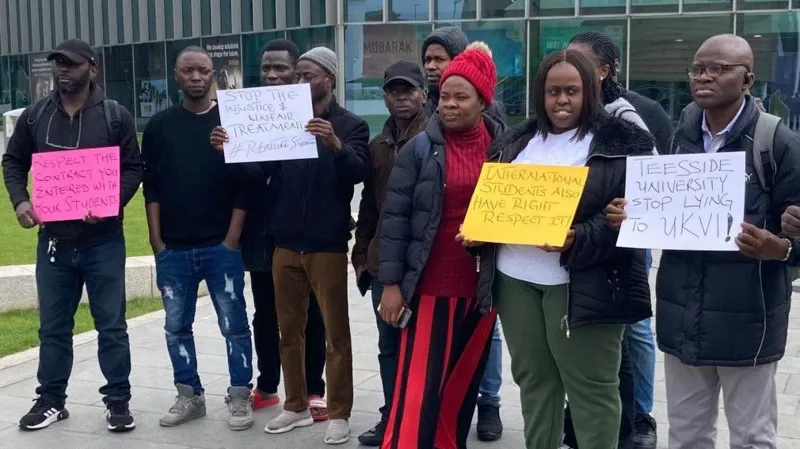News
Tuition: Nigerian students blocked from studies, ordered to leave UK

Some Nigerian students have been thrown off university courses and ordered to leave the UK after a currency crisis left them struggling to pay tuition fees on time.
The Teesside University students were blocked from their studies and reported to the Home Office after the value of Nigeria’s naira plummeted, wiping out their savings, reports the BBC.
Some told the BBC they felt suicidal as they accused the university of taking a “heartless” approach to those who fell into arrears as a consequence.
A university spokesman said failure to pay was a breach of visa sponsorship requirements, and that it had “no choice” but to alert the Home Office.
The Home Office said visa sponsorship decisions rested with the institution.
Nigeria is currently experiencing its worst economic crisis in a generation, which is having a significant impact on Nigerian students at some UK universities.
Before beginning their studies at Teesside, affected students were told they had to show proof of having enough funds to pay tuition fees and living expenses.
However, those funds were significantly depleted as a result of the crisis in their home country.
This exacerbated financial problems already being experienced by students as a result of the university changing tuition fee payment plans from seven instalments to three.
A group of students, 60 of whom shared their names with the BBC, began pressing the university for support after a number of people who defaulted on payments were frozen out of university accounts and involuntarily withdrawn from their courses.
Some were reportedly also contacted by debt collection agencies contracted by the university.
Adenike Ibrahim was close to handing in her dissertation at the end of two years of study when she missed one payment and was then kicked off her course and reported to the Home Office.
“I did default [on payments], but I’d already paid 90% of my tuition fees and I went to all of my classes,” she said.
“I called them and asked to reach an agreement, but they do not care what happens to their students.”
She said the experience was “horrendous” and she did not know what was happening with her qualifications.
“It has been heartbreaking for my son especially, he has been in so much distress since I told him,” Ms Ibrahim added.
The Home Office told students, including Ms Ibrahim, that their permission to enter the UK had been cancelled because they stopped studying at the university.
The letters, seen by the BBC, offer a date by which the student must leave the country and say they do not have a “right of appeal or administrative review against the decision”.
Since receiving his letter, one master’s degree student – who did not want to be named – said he had seriously considered suicide and was not eating or drinking.
Esther Obigwe said she repeatedly tried to speak to the university about her financial struggles but received no response, until she too was blocked from her studies and received notice to leave the country.
“I attended all of my classes and seminars, I’m a hell of an active student,” she said.
“It is disheartening, I am now on antidepressants and being here alone, I have nobody to talk to.
“For over two months, I’ve barely eaten or slept and I don’t understand why this is being meted at us, we didn’t do anything wrong.”
She added that most of the students had “spent a lot of money to be here”.

